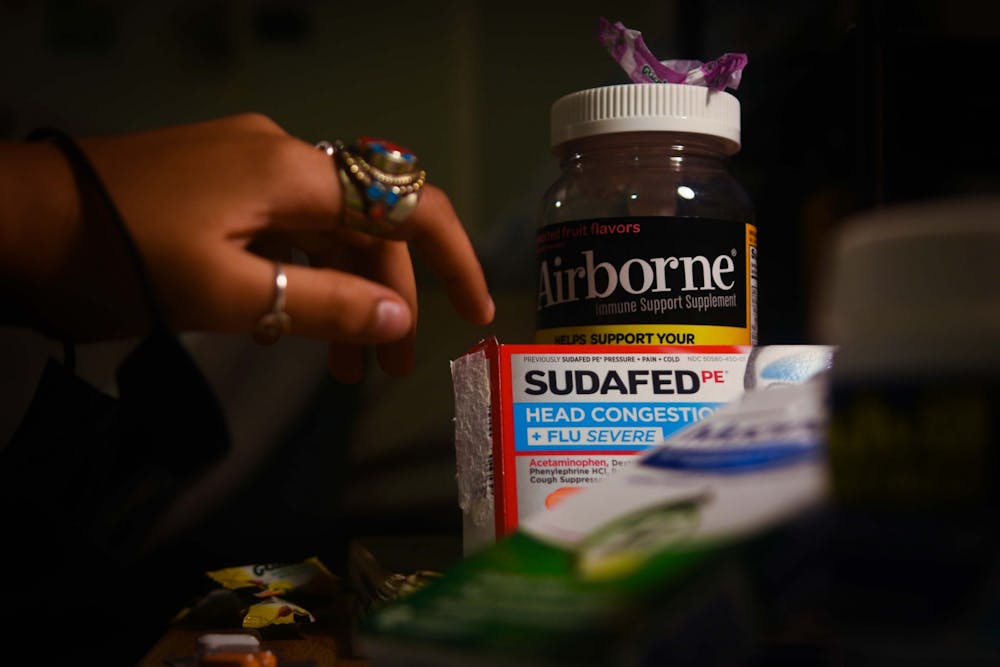
Students with the "freshman plague" have various flu-like symptoms.
Credit: Adya GuptaIt started out with a slight sore throat in the morning. Then a runny nose followed by congestion. By the end of the day, I had many of the symptoms of the Delta variant of COVID-19. I panicked and became full of anxiety. Convinced this was more than just my seasonal allergies (despite being fully vaccinated), I immediately filled out my PennOpen Pass with my new symptoms and started a cautionary quarantine period at home for the sake of my professors and classmates. As is protocol, I went to my local pharmacy the next day to get a COVID-19 test and anxiously awaited the results. Over the next few days, I developed a fever and felt just downright sick. When the results came in, I was shocked: Negative.
I was convinced this was a false negative, so I got tested again, this time at a different pharmacy using a different lab. My parents, who also developed symptoms, also got tested. I waited a few days once again and then received all the results at once. Negative. “SARS-CoV-2 Not Detected.” With all my symptoms now gone and my tests submitted, I reached out to the PennOpen Pass team who then cleared me for my return.
According to my doctor and Student Health Services, what I had was not COVID-19 but likely a different, much more benign, common cold that had been circulating in Pennsylvania which inconveniently displayed many of the same symptoms of the Delta variant. I was confused. “But I had all the symptoms of COVID-19,” I quickly said to my doctor. “Yes, but other illnesses exist that can make you sick besides COVID-19,” he retorted.
Throughout our time in lockdown last year, we largely felt as if COVID-19 was the only virus that could make us sick and all but forgot what getting sick was like before the pandemic. We’d get colds. We’d get the attenuated flu. And we’d stay home to recover. However, our new heightened awareness of illness around us has primed us to think that any time we feel sick, it must be COVID-19. And that, as I and others who had similar experiences learned, is simply not the case.
Despite wearing masks and following other mitigating practices, we will still get sick, and we must learn to accept that. The immense amount of anxiety from both peers and ourselves that comes with the onset of a runny nose is unfounded. We have gotten to the point where people feel obliged from a fear of being ostracized to assure others that they do not have COVID-19, regardless of whether they know this as a fact.
We have seen that the chance of a breakthrough infection is low and that the chance of becoming seriously ill from it is even lower. Here at Penn, College Dean Paul Sniegowski informed the student body in a Sept. 14 email that “in-person teaching is associated with a very low probability of COVID transmission,” which has allowed in-person instruction to continue. Obviously, we should continue testing and practicing other precautions against community transmission. Yet, the go-to reaction of panic at the outset of some symptoms, especially when we are now back in-person where we will encounter other common winter illnesses, does not serve us or our community any good and will only plague our in-person Penn experience with fear. If we test positive for COVID-19, then treat it as such.
So, as we start to head into the colder months, we should give ourselves pause before panic when we start to feel ill. As humans, we will get sick again and we must not immediately become plagued with the anxiety that it is COVID-19, because quite possibly, it is not. We also must not jeopardize those who can still become significantly ill from COVID-19 and other illnesses. This means we should get vaccinated against the flu and COVID-19 (including possible booster shots). My own experience with pseudo-COVID-19 was the beginning of our world’s new normal where we must learn to navigate a bizarre new life involving our health. But we will be okay once we start to accept what has become reality. Your mental health, your body’s health, and your community at large will thank you.
JOSEPH M. SQUILLARO is a College senior studying philosophy, politics and economics from East Setauket, N.Y. His email is jsqu@sas.upenn.edu.
The Daily Pennsylvanian is an independent, student-run newspaper. Please consider making a donation to support the coverage that shapes the University. Your generosity ensures a future of strong journalism at Penn.
Donate




